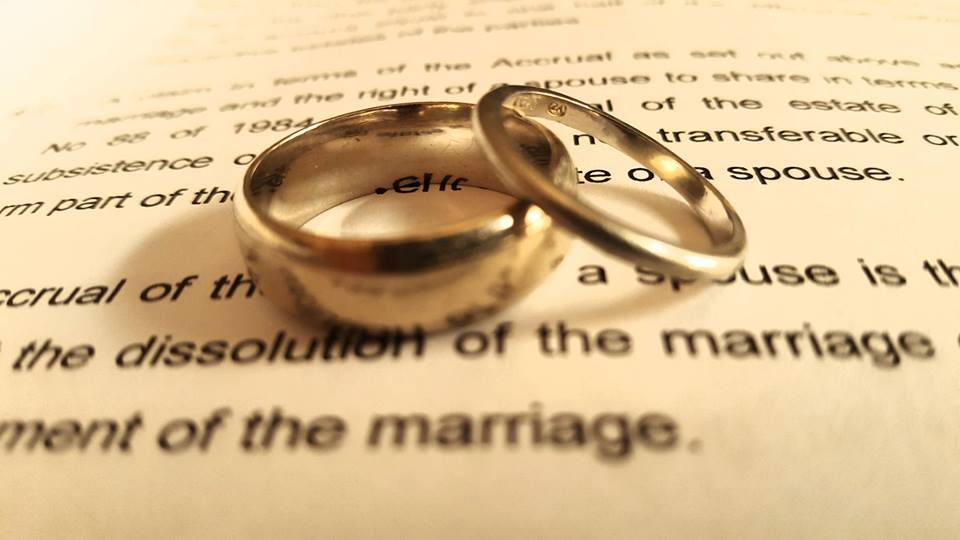Nobody wants to think about the legal aspect of marriage when there are so many exciting and romantic preparations to be made. Let’s look at the important options you have to look at before taking the plunge.
Getting engaged is such a magical time in any couple’s life. There are so many things to think about. The dress, venue, cake, and all sorts of romantic details. The last thing you want to think about is protecting yourself in case things don’t work out. But the harsh reality is that there are many reasons to make sure you are legally protected.
Marriage has far-reaching consequences in respect of the spouses and their property. Marriage creates legal rights of one spouse to the company, affection, services, and support of the other. Courts have stated that entering into a marriage is a matter of intense private significance, as parties make a promise to establish an intimate relationship for the rest of their lives. The decision to marry should not be taken lightly. Our law recognises traditional marriages, customary marriages, same sex marriages, universal partnerships, and civil unions.
There are, however, three main matrimonial property systems you should consider before tying the knot. It is important to note that all marriages will be in community of property unless a valid antenuptial contract is entered into. Where the parties opt to enter into an antenuptial contract, whatever the provisions, it must be executed before a Notary prior to the wedding and registered in terms of the Deeds Registries Act.
1. Marriage in community of property
-
- When spouses marry in community of property, generally all assets of both spouses become part of the joint estate;
- The spouses become tied co-owners in undivided half-shares of all the assets and liabilities they have at the time of the marriage, as well as during the course of the marriage.
- Creditors of spouses who are married according to this system can look to the estates of both spouses for recovery of a debt;
- Both spouses have equal powers regarding the disposal of the assets of the joint estate and the management of the joint estate.
- A spouse may not, without the written consent of the other spouse, purchase or sell immovable property or register / cancel mortgage bonds over immovable properties;
- Where a spouse wishes to institute or defend legal proceedings that do not relate to a spouse’s business, written consent of the other spouse is required.
- If one spouse insolvent, the entire estate and the other spouse are considered insolvent too.
- Upon the death of one of the spouses or should the parties divorce, each spouse will receive half of the marital estate, both assets and liabilities.
2. A marriage out of community of property, excluding the accrual system.
-
- Each spouse retains the estate he or she had before the marriage, as well as everything he or she acquires during the marriage. There is a complete separation of property.
- Each spouse has full capacity to act and can enter into contracts without the other’s consent or assistance. The spouses can enter into contracts with each other.
- The spouses are not liable for each other’s debts, as each spouse binds only himself/herself.
- Spouses have full capacity to litigate and can independently institute or defend legal proceedings.
- Spouses are independent with regard to their estate and creditors.
- Upon death or divorce, neither spouse will share in the other’s estate at all, unless the spouse’s Will dictates otherwise.
- This system is sometimes recommended for older spouses who already have their own substantial estates before the marriage.
3. A marriage out of community of property with the application of the accrual system.
-
- Spouses share in the growth their estates have shown, without there having been a joint estate during the marriage according to accrual.
- The accrual system is a formula that is used to determine how much the party whose estate with a bigger accrual / growth during the marriage will have to pay the party whose estate showed a smaller accrual / growth.
- In terms of the accrual system, both parties’ estates are independent during the subsistence of the marriage by death or divorce, they share in the accrual accumulated by each other during the marriage.
- If the accrual system applies, then a spouse (upon dissolution of marriage) will have a claim to share in the growth of the other spouse’s estate, according to a calculated formula, without there having been a joint estate during marriage.
- Spouses can expressly alter their particular shares of the accrual in the antenuptial contract.
- Each spouse retains and controls his or her own estate during the subsistence of the marriage, but their capacity to alienate any of this property is limited.
- The spouses are not liable for each other’s debts, as each spouse binds only himself/herself.
- This system is sometimes recommended where one spouse will leave employment for a period of time in order to look after children and/or the household while the other spouse continues to work and build his/her estate.

